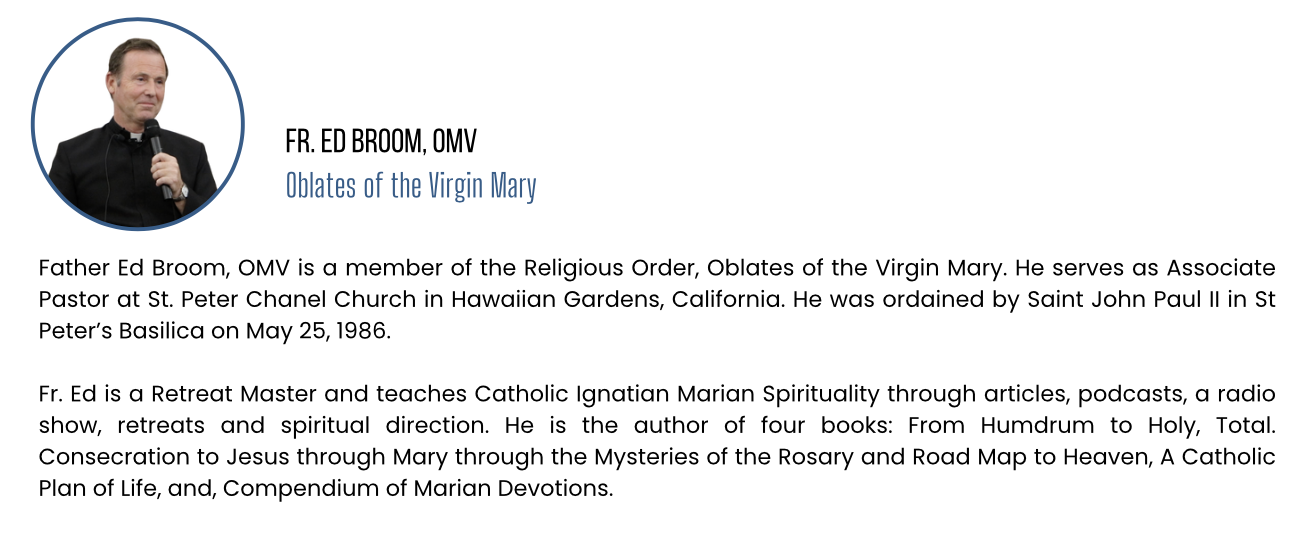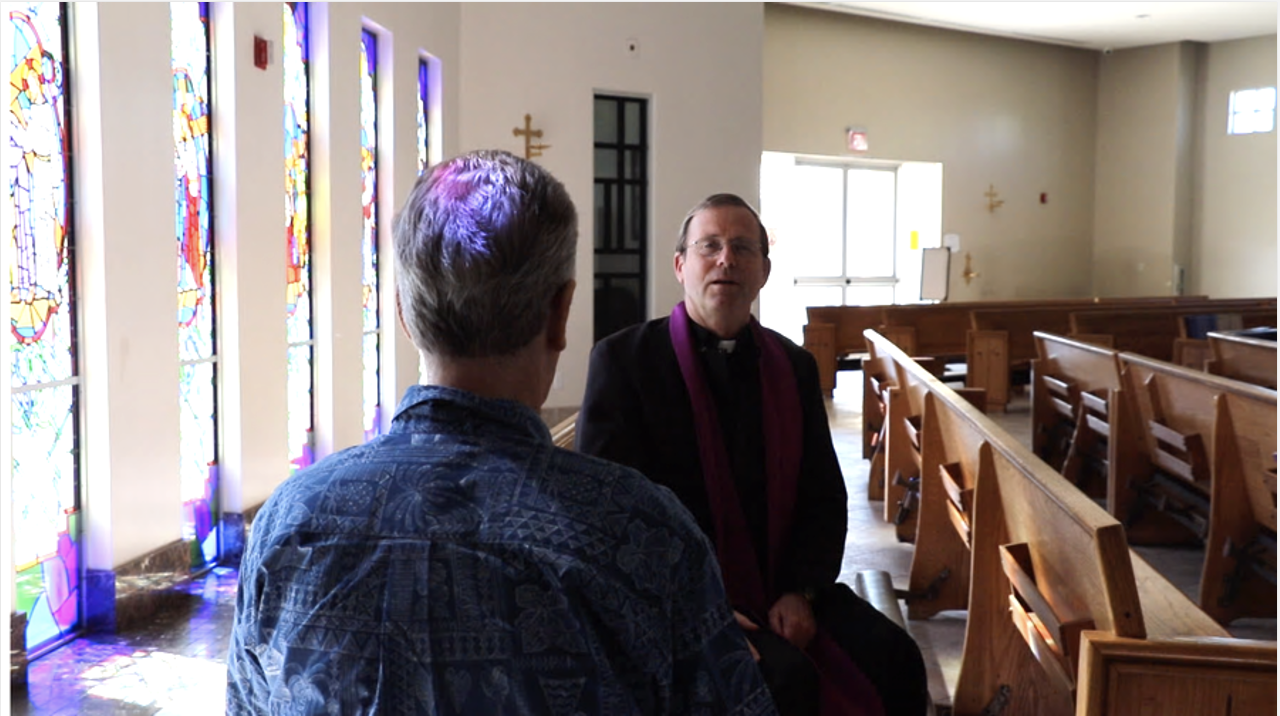

A very interesting phenomenon: observing a person pass from a state of interior tension manifested by exterior tension to a state of peace and tranquility! Very often this is the case of a penitent standing in the line and preparing to receive the Sacrament of Confession, wherein tension is experienced. However, upon leaving the Confessional, having confessed and received absolution, interior peace radiates even from the very countenance of the person.
About 35 years ago, Mary Ann Budnik wrote a short but marvelous book on the Sacrament of Confession with the title, “Looking for Peace? Try Confession!” This mother encouraged the frequent reception of the Sacrament of Confession for the peace and sanctification of the family members.
Budnik made this astute observation! When there was mounting tension, pressure, as well as an increase of disagreements and quarrels among the family members, the conclusion was very clear: time for the family members (and this means all of the family members) to head for the confessional.
Undoubtedly, after each and every family member made a good confession, there would reign peace among the family members. This mother noticed this interesting occurrence.
Theologically this holds water and stands to reason. For this simple reason: among the several effects that sin produces are tension, turmoil, selfishness, pride, self-love and fights. A good Sacramental confession militates against all of the above negative fruits of sin.
This being said, an excellent proposal to fortify sanctity, harmony, love, peace and joy in the family, also known as the “Domestic Church”, should be the practice of monthly family confessions. From the Dad to the youngest member who can go to confession, all should make their monthly Sacramental Confession. Remember the title of Budnik’s book: “Looking for Peace? Try Confession!” Try it! It works! Why not today, priest of the family – the Father, decide upon a day and an hour every month and instill monthly confession as a habit for your entire family!
THE FOUR C’S TO MAKE A GOOD SACRAMENTAL MONTHLY CONFESSION.
The Founder of OPUS DEI, Saint Josemaria Escriva Balaguer, coined a four-word catchy acronym to help us make a good Sacramental confession. Let us list the four and then we can explain them; even more important, let us implement them! Behold the four C’s to make a good Confession: 1) Clear, 2) Concise, 3) Concrete, and 4) Complete. Let’s explain them one at a time.
1. CLEAR. In the Diary of Saint Faustina, “Divine Mercy in My Soul”, Jesus specified to the Saint that the starting point for an efficacious reception of Confession is the indispensable quality of TRANSPARENCY. Another word for transparency is that of clarity, or if you like, being clear. Whereas to the contrary, confusion, murkiness, blurriness, ambiguity are all signs of the enemy of our soul, the devil himself. While signs of the Good Spirit are that of clarity and transparency. Therefore, when you speak to the priest in the Confessional, who represents Jesus Christ, the Divine Physician, speak slowly, clearly, moderately, sincerely and with great openness. The primary effect of the Sacrament of Confession is healing of the wounds that we contract due to sin. Sin wounds us; Jesus, the Divine Physician, heals us. A Doctor will not be able to heal the sick patient unless the patient reveals his bodily maladies with transparency and clarity. The greater the clarity of the malady, the better the applications of the remedy.
2. CONCISE. Perhaps the most renowned saint and Confessor in the Catholic Church was Saint John Marie Vianney, also known as the Cure of Ars. Once he overcame the many obstacles he encountered when he first came to the Parish, people from all over flooded to his confessional. It is calculated that he confessed from 13 to 18 hours every day for close to forty years. His magnetism as a priest, confessor, and living saint reached a point that people would be waiting sometimes for days to enter his confessional. His biographers noted that, as a general rule, he did not spend an extended period of time with each penitent. Usually, though not always because there are always extenuating circumstances, a confession would take about three minutes. Concise means that the penitent should be well-prepared for their confession. What could be very helpful is for the penitent to actually write down their sins before entering the confessional. Also, even before meeting the priest, the penitent should have already made an effort to make a perfect Act of Contrition. In a word, 95% of making a good confession is what has been done before the penitent enters the confessional. In the TV Program Dragnet with Joe Friday, there is the classical and unforgettable statement that he would make before entering into the case: “JUST THE FACTS MA’AM, JUST THE FACTS….” In a parallel sense, the penitent should enter the confessional with this primary purpose: “JUST THE SINS MA’AM; JUST THE SINS….” Elements that are extraneous to Confession should be set aside. To be absolutely clear: the primary substance and content of any good confession is the sincere, transparent and concise confession of one’s own personal sins. This being said, your confession should not be the confession of your husband or wife, son, daughter or mother-in-law, but your own personal sins. At times, it might be the case that we talk too much because we are skirting the real issue of our own sins. Concise means brief and to the point; not long-winded and beating around the bush!
3. CONCRETE. Another essential quality of making a good Sacramental Confession is the importance of being concrete in expressing our sins. Such abstract expressions should be avoided: “I’m not good enough… I could be a better person… I’m not perfect… I broke the commandments… I am a really bad sinner… I failed God… My words could be better… I am just like the mass of humanity – a sinner… My sins are like everyone else’s.” All of the above are abstract, abstruse, nebulous, intangible, extremely generic and lacking in concrete expression. Concrete examples would be the following: “I missed Sunday Mass because I am lazy… I viewed pornographic videos three times for a half hour each time… I stole money from my Company because I am greedy… I willfully got drunk three times on the weekend with my alcoholic buddies.” These latter confessions are all concrete and expressive of the root cause! Excellent!
4. COMPLETE. The Sacrament of Confession has to be complete. The Catechism of the Catholic Church, as well as the Code of Canon Law, specifies that for a Confession to be complete the penitent must confess both the number of mortal sins, as well as the species—meaning, the kind of sin that was committed. An example of this would be the following, a couple before getting married perhaps has not been to confession in a long time, perhaps a year. If this future husband has not been to Mass in a year and fell into premarital relations or abused drugs, then a complete Confession might be the following: “Bless me, Father, for I have sinned, my l last Confession was a year ago and these are my sins…. I abused drugs 10 times; missed Mass 52 times, and had premarital relations 15 times.” His Confession was perfectly confessed: both the specific number of times, as well as the type/species of sin. Then he hears these wonderful words: “… I absolve you of your sins in the name of the Father, and of the Son, and of the Holy Spirit. Amen.”
Now if these Four C’s are applied in the Sacrament of Confession—Clear, Concise, Concrete and Complete, then God’s Sacramental grace of healing will descend upon our souls and we will leave the Confessional with a peace that passes all understanding. Seeking true peace of soul? Why not try making a good Sacramental Confession, you, as well as your entire family!